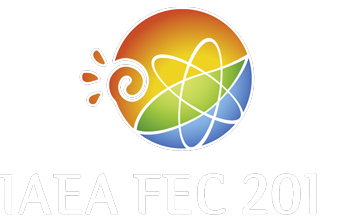Speaker
Dr
Sang Gon Lee
(National Fusion Research Institute)
Description
Highly coherent structures associated with an extremely long-lived saturated magnetohydrodynamic (MHD) instability have been observed in KSTAR tokamak under a long-pulse and steady-state operation. As the plasma performance is increased in advanced tokamak regimes, possible deleterious effects of MHD modes become more important, especially for steady-state burning plasmas in the next-step devices such as ITER and DEMO. One of the commonly seen modes is the m = 2, n = 1 resistive kink mode that either leads to confinement degradation, or mode locking followed by a full disruption. In KSTAR, however, long-pulse discharges regularly exhibit a coherent structure in the form of a saturated pressure-driven MHD mode that can be sustained as long as 40 seconds, the full discharge duration, when the mode is located near the plasma core region with a broad safety factor profile with q0 larger than 2.
| Country or International Organization | Korea |
|---|---|
| Paper Number | EX/P4-10 |
Author
Dr
Sang Gon Lee
(National Fusion Research Institute)
Co-authors
Dr
Ahmet Aydemir
(National Fusion Research Institute, Daejeon, Korea)
Dr
Bae Young Soon
(National Fusion Research Institute)
Mr
G. H. Choe
(POSTECH)
Prof.
Gunsu YUN
(Pohang University of Science and Technology)
Dr
Hyungho LEE
(National Fusion Research Institute)
Dr
JaeChun Seol
(National Fusion Research Institute)
Ms
Jeong Won Yoo
(National Fusion Research Institute)
Dr
Jun Gyo Bak
(National Fusion Research Institute)
Dr
Laurent Terzolo
(National Fusion Research Institute)
Mr
Lee Kyu Dong
(National Fusion Research Institute)

